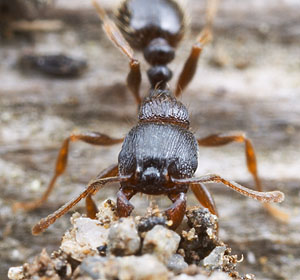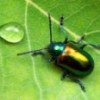
Birgit Schlick-Steiner, of the University of Innsbruck in Austria, has funding for a Ph.D. student to work on the molecular ecology of the Tetramorium caespitum complex. This research group has produced some top-notch science in recent years, and if you are looking to become a professional myrmecologist this is an excellent opportunity. You'd receive training in some of the most current techniques at the interface of genetics, ecology, and taxonomy. The full announcement is below the fold.
MOLECULAR ECOLOGY, INSTITUTE OF ECOLOGY, UNIVERSITY OF INNSBRUCK
PhD position
The University of Innsbruck, Austria, seeks to hire at the PhD student level in the area of molecular ecology. The position is a 4-years position at the Molecular Ecology group of the Institute of Ecology, starting from 1 April 2009.
The recently founded Molecular Ecology group uses the exciting opportunities offered by the advance in molecular biology, to study ecology as a snap-shot in the spatiotemporal continuum of evolving biodiversity. Data from multiple sources are integrated to enhance the success of biodiversity research. The research focuses on terrestrial animals. The group's mission is to centre on the Alpine Space, by interdisciplinary means, and in international collaboration networks.
***Responsibilities***
1. participation in an interdisciplinary and integrative biodiversity research project on ants (see Project description), i.e., addressing of population genetic, phylogeographic, phylogenetic and taxonomic questions relating to the delimitation of cryptic species, and the evolution and evolutionary ecology of cryptic diversity
2. application of molecular genetic lab techniques (mtDNA, microsatellites, possibly AFLP) and associated inference methods (gene flow analysis, phylogenetic reconstruction, phylogeographic analysis coupled with ecological niche modelling), morphometry and statistical methods related to discriminant analysis as well as elaboration of formal taxonomic consequences (analysis of type specimens, descriptions under the ICZN)
3. fieldwork
4. contact and collaboration with a range of scientists at the Faculty of Biology in Innsbruck, at other Austrian research facilities and internationally
5. preparation of manuscripts
6. participation in the PhD program of Innsbruck University; see <http://www.uibk.ac.at/fakultaeten-servicestelle/pruefungsreferate/studi…;
***Selection criteria***
A. completed study of biology, MSc level
B. demonstrated research experience in population genetics, phylogeography, phylogenetics or taxonomy of arthropods
C. keen interest in evolution and ecology
D. ability to work effectively as part of a multi-disciplinary team
E. flexibility in the course of progressing research
F. ability to work independently
G. ability to work under pressure
H. good knowledge of oral and written English
***PhD supervisor***
Birgit C. Schlick-Steiner
***Salary***
The annual gross salary is Euro 21,932.40; should at some stage teaching possibilities arise and the successful candidate opts for at least 2 hours of teaching per week, the salary would be increased accordingly
***Project description***
An outstanding number of cryptic species was discovered in the European Tetramorium caespitum/impurum ant complex but very recent, unpublished evidence suggests that intermediate forms between two of the cryptic species may occur, necessitating to revisit the present species delimitations, also through additional molecular markers.
Central hypotheses to be tested for the whole complex hence include whether observed genetic and phenetic variation is intraspecific vs. interspecific and whether or not gene flow occurs among species, recently and/or in the evolution of the complex. Via an interdisciplinary, integrative approach the project aims at (i) definitive species delimitations including taxonomic acts, and (ii) elucidation of the evolutionary patterns that shaped the cryptic diversity (e.g., parallel evolution? convergence? plesiomorphy? introgression?) and how they were mediated (e.g., palaeoclimatic dynamics? ecological niche shifts? interspecific competition?).
Collaborators include Birgit Schlick-Steiner (University of Innsbruck; PhD supervision), Bernhard Seifert (Senckenberg Museum of Natural History Goerlitz; morphometry and taxonomy), Lacey Knowles (University of Michigan; coupled phylogeographic and ecological niche modelling), Karl Moder (University of Applied Life Sciences and Natural Resources Vienna; statistics), Florian Steiner (University of Innsbruck; project coordination).
Further reading:
Schlick-Steiner et al 2006 Molecular Phylogenetics and Evolution 40:259-273
Schlick-Steiner et al 2007 Trends in Ecology and Evolution 22: 391-392
Moder et al 2007 Journal of Zoological Systematics and Evolutionary Research 45: 82-87
Steiner et al 2006 Myrmecologische Nachrichten 8: 175-180
Steiner et al 2008 Conservation Genetics 9: 757-759
Schlick-Steiner et al 2007 Biological Journal of the Linnean Society 91: 247-255
Steiner et al 2008 Diversity and Distributions 14: 538-545
***How to apply***
To apply, please submit, by E-mail to <fss-technik@uibk.ac.at>, with cc to <birgit.schlick-steiner@uibk.ac.at>, and with the subject line "Chiffre: BIO-5459 - Bewerbung um ein wissenschaftliche Stelle": a cover letter (including a reference to "Chiffre: BIO-5459"), systematic point-by-point replies as to your readiness for the responsibilities and how you meet the selection criteria, brief statement of research interests, list of relevant methods successfully applied thus far, complete curriculum vitae, complete list of publications, and up to three pdf files of published work. Also, arrange for two letters of recommendation to be sent to <birgit.schlick-steiner@uibk.ac.at>
Applications must be written in German or English. The deadline for receipt of all applications is 4:00 pm CET of 28 January 2009.
The University of Innsbruck is striving to increase the percentage of female employees and therefore invites qualified women to apply. In the case of equivalent qualifications, women will be given preference. An offer of employment is contingent on a satisfactory pre-employment background check.
The (legally binding) announcement in German can be found at: http://www.uibk.ac.at/service/c101/mitteilungsblatt/2008-2009/17/mittei…
***The research institution and its environment***
The University of Innsbruck has a long-standing and internationally reknowned tradition in life sciences and offers a vibrant research atmosphere. It has 21,000 students and 3,000 members of staff. Innsbruck is situated in the Alps and very close to Switzerland, Germany and Italy; scenery and outdoor recreation are phantastic.
***More information needed?***
For more information, please contact the PhD supervisor: Birgit Schlick-Steiner <birgit.schlick-steiner@uibk.ac.at>
Birgit C. Schlick-Steiner
Professor of Molecular Ecology
Institute of Ecology
University of Innsbruck
Technikerstr. 25
A-6020 Innsbruck, Austria
Phone: +43 512 507-6120
Fax: +43 512 507-6190
http://www.uibk.ac.at/ecology/forschung/molecular_ecology.html.en
